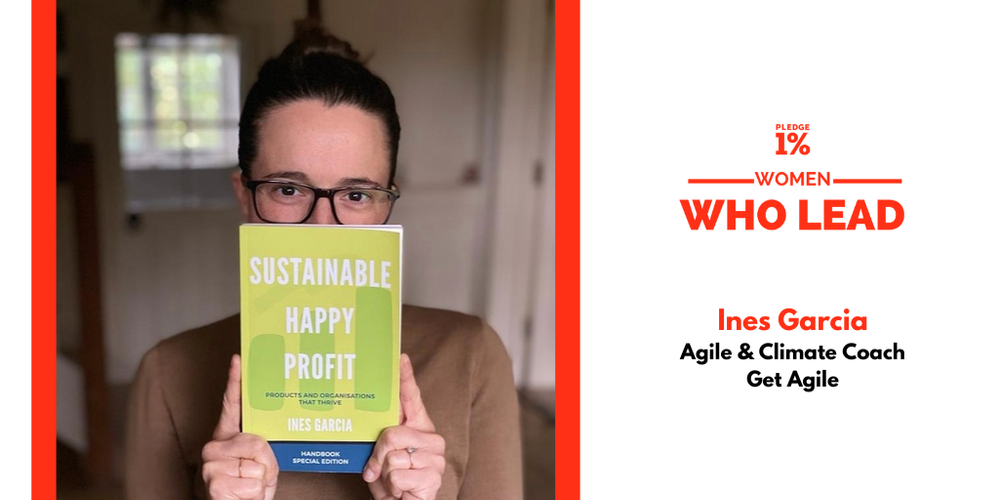
Ines Garcia
Agile & Climate Coach, Get Agile
Wiltshire, UK
Pledge 1% provides a framework for businesses to do good. Do you think it’s important for today’s corporate leaders to prioritize social impact? If so, why?
Doing well and doing good. We’re used to operating by the maxim “you can have cheap, fast or good: pick two”, but with the triad of sustainability, happiness and profit you really can have all three. In fact, with those things as a focus they actually nourish each other. Companies are composed of individuals and we can do both, do good and do well. In fact, it’s more rewarding. The value of a company’s goods and services is relative to the waste it generates.
“Sustainability and happiness are not at the expense of profit but a means to it.”
Do you give back to the community with your team and work? If so, what does this look like?
See last year impact report includes showcase of Pledge as well to other organizations I support as Stop the Trafikk, Pepup Tech, Refugeeforce, Agile Alliance (Sustainability Initiative), Pledge1%, Business Declares, Doughnut Economics Action Lab, Work on Climate & Business of Purpose communities, The Mentorship Central & YeurLeadin.
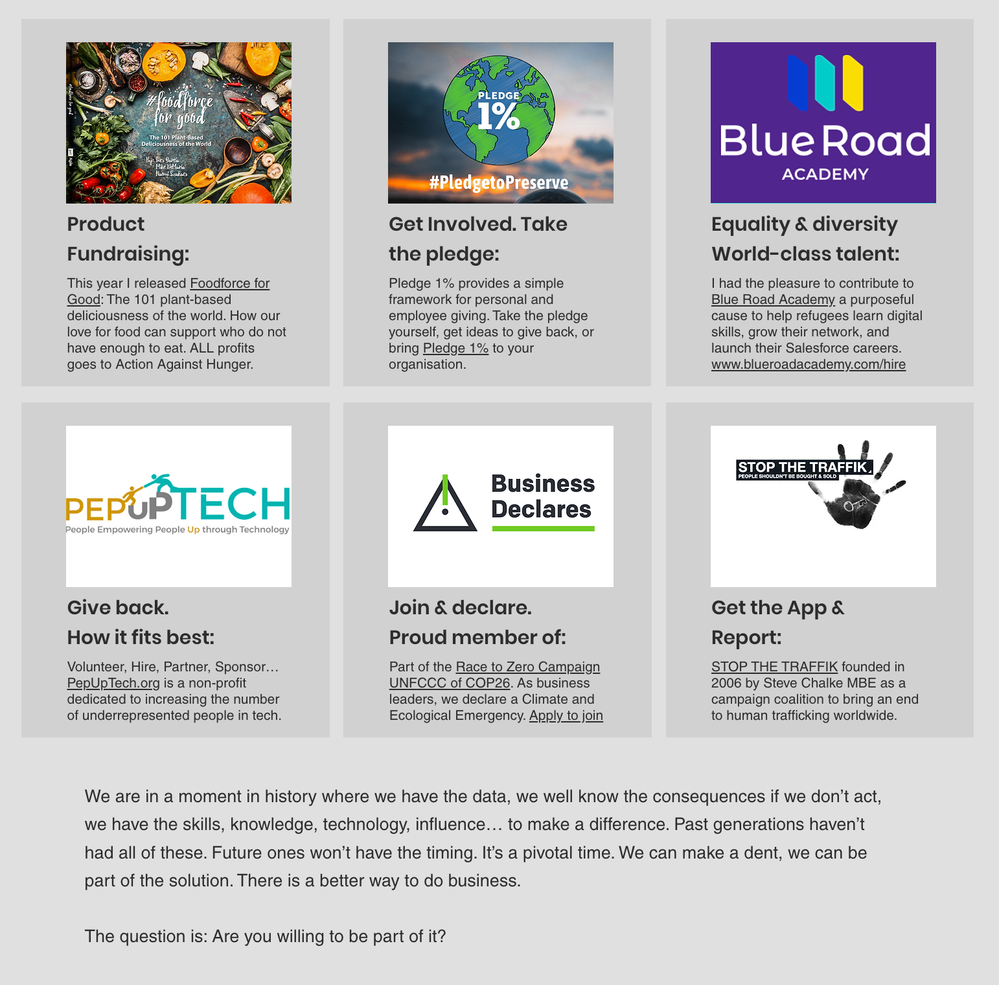
This year’s International Women’s Day themes are focused on investing in women and inspiring inclusion. What can we do to make today’s workplaces more equitable and inclusive for women?
Rich functioning ecosystems are diverse. And it goes beyond gender and ethnicity. Some time back I came across a model of a diversity map; it accounted for how we relate and connect, how we think and process information, what we believe and feel, what we do professionally and also how we do it, physical traits and many others. A model which unfortunately I haven’t been able to locate again. Diversity is wide, it promotes health, vitality, productivity of ecosystems; just like in nature.
What advice do you have for women who are just starting their career?
Bias, preconceptions, westerner old fashion culture, privilege, eco-chambers… that impact how one approaches challenging situations. The delicate and damaged very systems that sustain our life on earth, is a challenging situation. There is much ancestry and indigenous knowledge we can tap into, and also there is much we can learn from nature. The solutions are all around us, if we ‘quiet our cleverness’ and pay attention, as the mechanisms, strategies and functions to solve our problems are in living beings all around us, those that have evolved and refined over the last 3.8 billion years. Let’s break free from dualism, there is more to us than just one attribute. There are some fiscal and neurological traits we can tap into to evolve and speed the required work towards the Sustainable Development Goals.
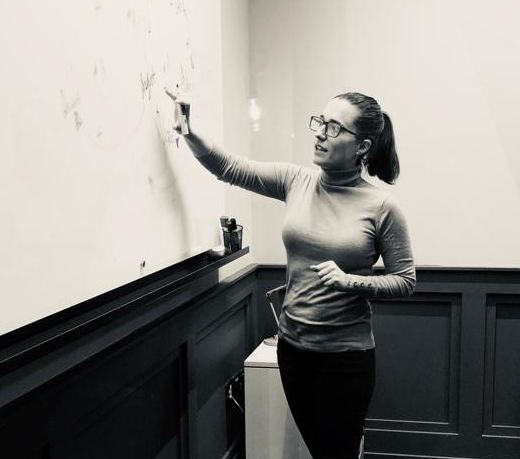
What are you looking forward to this year? Are there any goals (personal or professional), activities, or experiences you are excited about?
Over the last year I have been crafting a programme with 3 other agile coaches. We are all freelancers and for this, we have created the Coalition of the Willing. With our first 4 weeks program we address how change agents today can embed sustainability into their daily practice, we have called it “Agile Sustainability in Practice: Navigating Circular Economy, SDGs, and Complexity Science”. With it we have also designed a “Pay It Forward” scheme for every registration supports towards someone who lacks the means, thus leveling the educational playing field. Basically, the USP is to evolve current agile practices to account for natural and social capital. Essentially skilling up for what’s on demand and what we ought to achieve within the next 6 years: The legally binding Paris Agreement. Not long at all now!
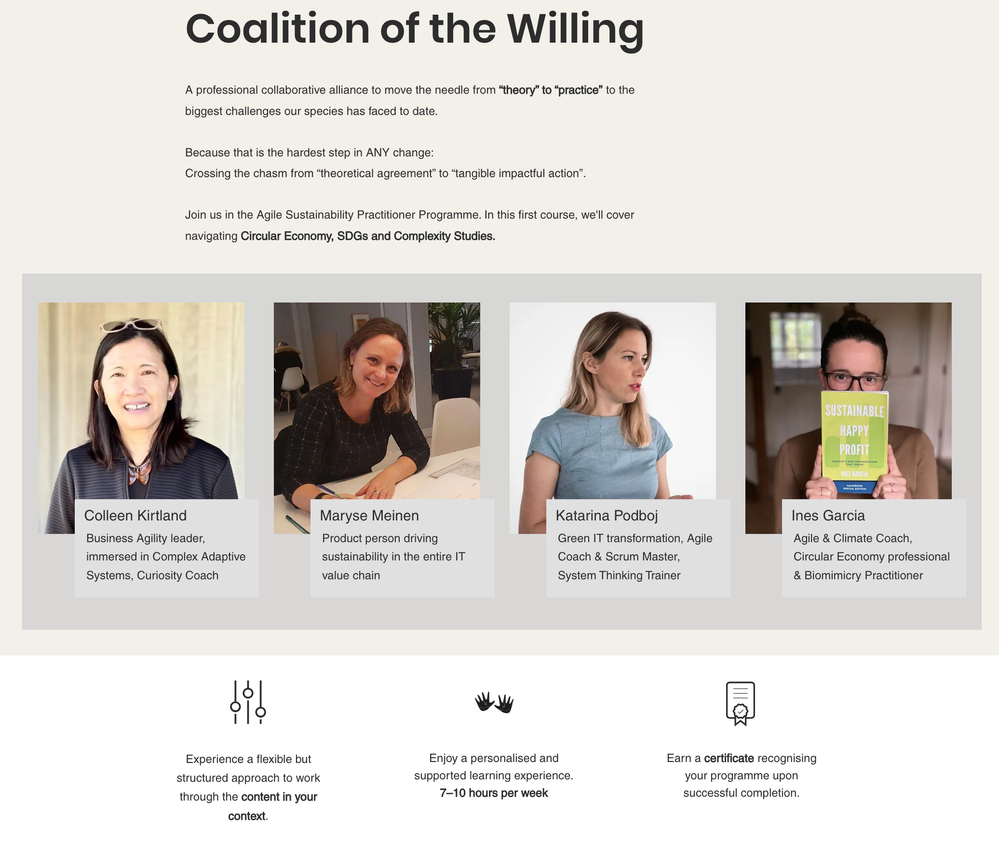
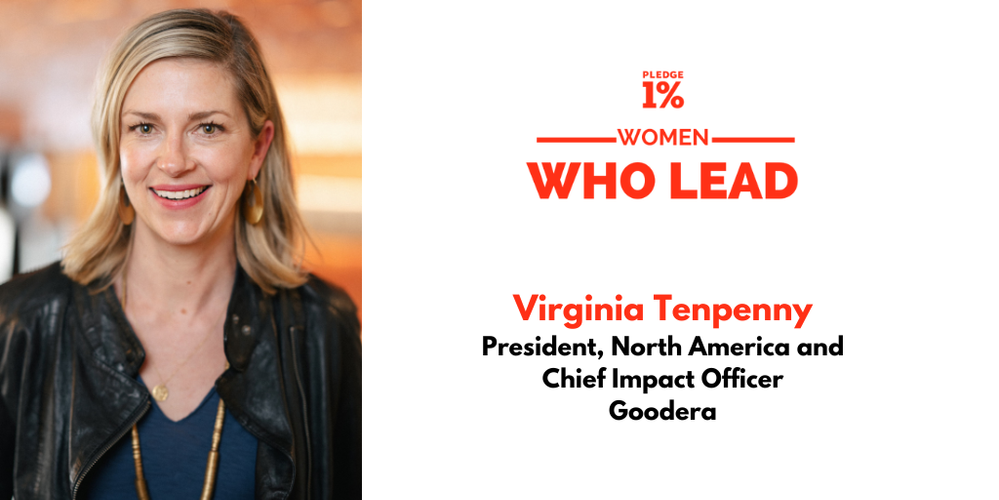
Virginia Tenpenny
President, North America and Chief Impact Officer, Goodera
Nashville, Tennessee
If you could describe yourself in one word, what would that be and why? Please explain with a short story or example.
Hopeful. I’m hopeful not because of a natural disposition but because I had the privilege of working among leaders who instilled an understanding of what hope is and how to cultivate it on and off the job. As a team, we nurtured the elements that make hope possible: agency, worth, possibility, connection and openness. This was a profound gift that delivered results for the business and continues to enrich all spheres of my life from leadership on the job, how I parent, and the belief I have in a brighter future for all.
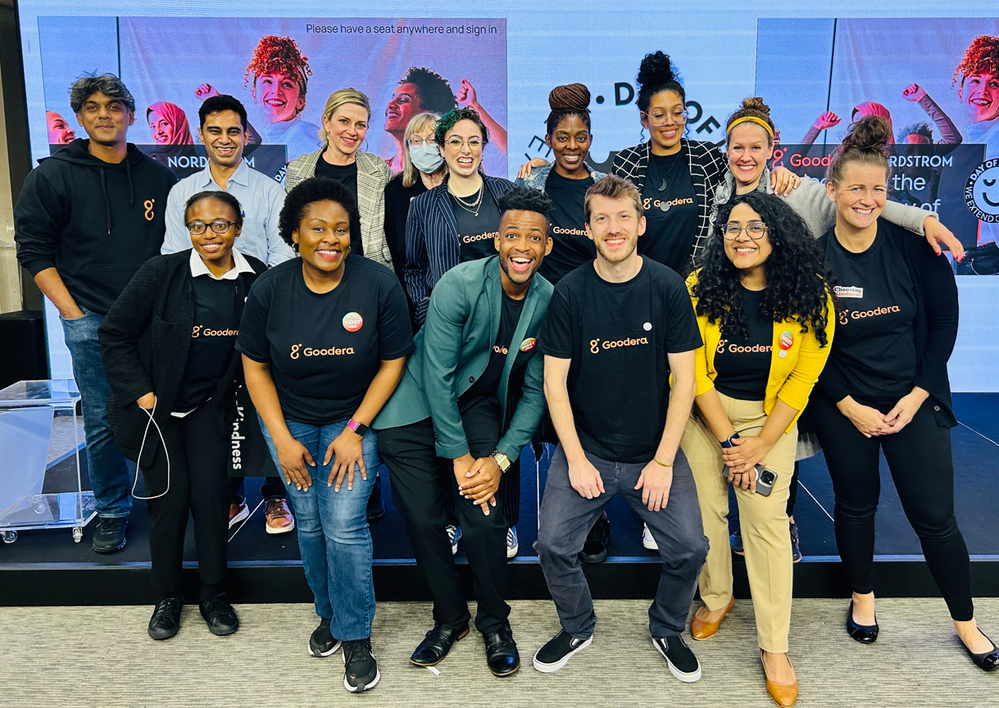
Pledge 1% provides a framework for businesses to do good. Do you think it’s important for today’s corporate leaders to prioritize social impact? If so, why?
Social impact is vital for companies who want to hire the best talent, build trust with their customers, and who have ambitions for the business to endure beyond this decade. An effective social impact strategy helps to future proof the business and sets conditions for mutual thriving across the workforce, the business and the communities it serves.
Do you give back to the community with your team and work? If so, what does this look like? Please feel free to add a specific story or experience.
Engaging in volunteering has been a part of every role I’ve held for over twenty years. I now have the opportunity to work for a company that makes it even easier for businesses to engage and deploy their best asset – their people – into communities to help advance change. As part of my job, I get to join colleagues to test new volunteer experiences, as well as join volunteer projects with our clients and their employees.
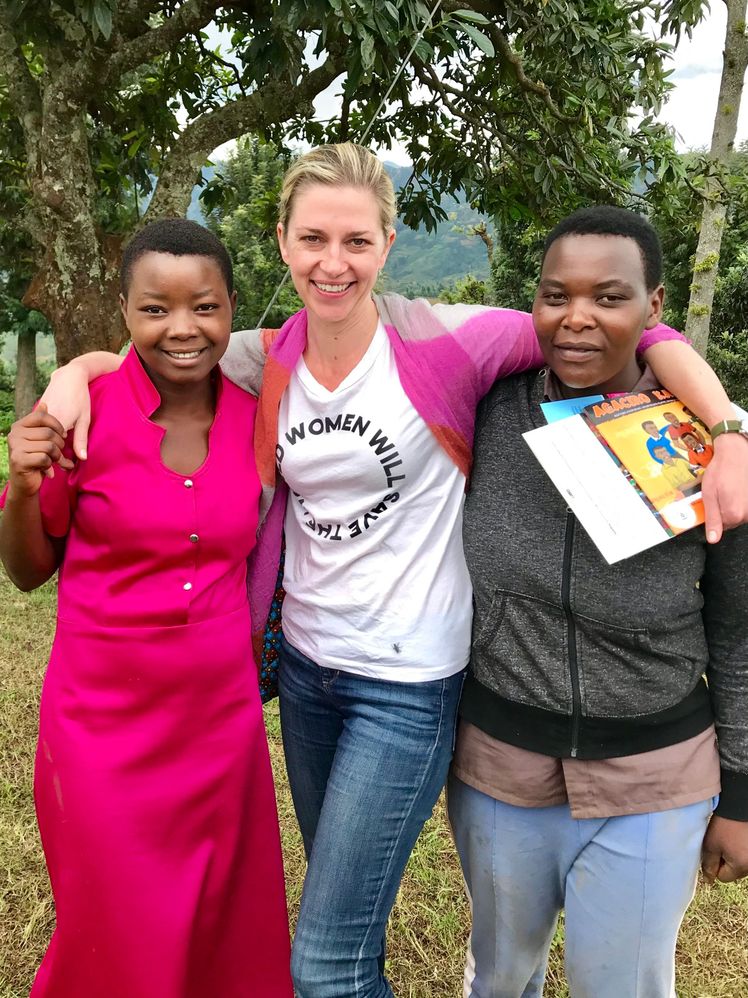
Beyond the job, I continue to serve on the board of directors for UNHCR, the UN Refugee Agency, which has provided me with the experiences and skills to help be a better leader on the job.
What’s the best piece of advice you ever received?
“Get out of your comfort zone”. Don’t be afraid to fail and trust that every experience is teaching you something that will serve you as you move forward.
This year’s International Women’s Day themes are focused on investing in women and inspiring inclusion. What can we do to make today’s workplaces more equitable and inclusive for women?
Creating equitable and inclusive workplaces for women requires a comprehensive approach that is reflected across policies, programs and company culture. Companies need to address structural issues from pay transparency to equity across pay and benefits. And people need to “see it to be it”, meaning leadership teams need to reflect the diverse workforce and it’s important for women to see leaders who may also be working moms or in a caregiver role.
Two-way mentorship is also important for leaders to understand challenges women face in the workplace and understand what support they need from their employer – from flexible schedules to training and mentorship programs. Focusing on creating a more inclusive workplace for women, or any specific population, accelerates the creation of a more inclusive workplace for all.
What advice do you have for women who are just starting their career?
My career advice is to follow the superpower + passion + priority formula.
“Reflect on your unique superpower: what are you particularly good at or enjoy doing? Embrace it and develop it. Next, reflect on your passion: what causes get you out of bed or issues do you find more intellectually engaging? Then find a company or team within a company where that cause is a priority.”
What are you looking forward to this year? Are there any goals (personal or professional), activities, or experiences you are excited about?
I’ve dedicated 2024 as my learning year and seek to learn as much as I can on the job, off the job as a parent, and to learn to play pickleball (and ultimately beat my husband).
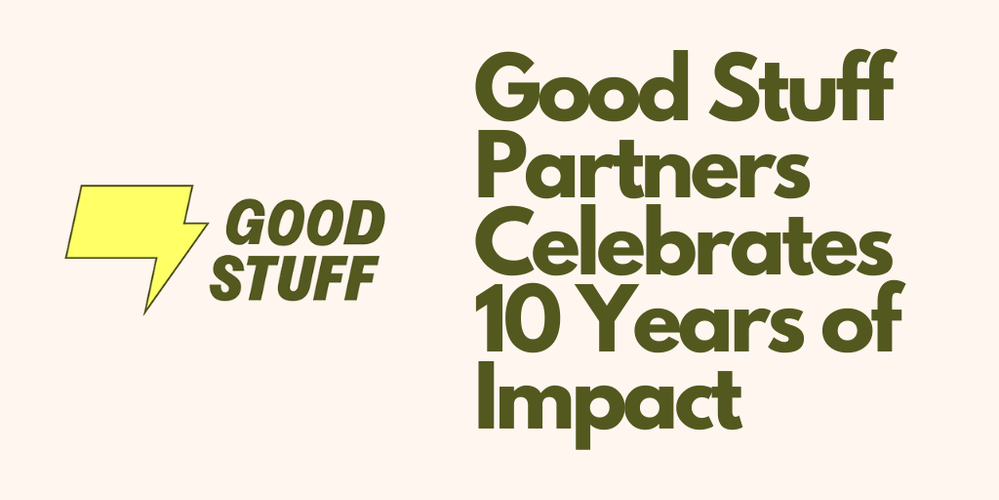
Originally published on Corporate Wellness Magazine
Author: Good Stuff Partners
Good Stuff Partners, a purpose-driven branding and communication agency, is celebrating 10 years of impact-driven work supporting local communities as well as global initiatives. On a mission to “build brands that give a damn,” Good Stuff Partners has elevated campaigns and causes spanning social and political justice, sustainability, healthcare access, and more.
When Adrian Power and Aimee Kilmer co-founded Good Stuff Partners a decade ago, they had a simple vision: work solely with brands that are doing good things for people, animals, and the planet. They’ve since provided branding, design, and identity work for Habitat for Humanity, Beyond Meat, VegNews, The Tides Foundation, Marin County, and dozens of other mission-driven organizations and companies. The agency’s values and ethos are also embodied in their credentials – a certified B Corp, Marin Green Business Partner, member of Pledge 1%, and Clean Creatives pledge member. And most recently, they made a commitment to increase employee wellness by trialing the 4-day workweek.
“Our work at Good Stuff Partners is about so much more than just designing a brand or campaign, it’s about capturing the true essence of a cause to evoke emotion, intrigue, and action, and that’s what drives us every single day,” said Aimee Kilmer, Co-founder and Creative Director.
“When we decided to start a purpose-driven agency, we had no idea what our success rate would be but it’s been extremely rewarding to see the validation of our work through our client’s success in reaching their impact goals. To be truly purpose-driven you need to be fully committed to your values and ethos – and be ready to turn clients away, which I think really sets us apart,” said Adrian Power, Co-founder and Brand Strategist at Good Stuff Partners.
“Our work at Good Stuff Partners is about so much more than just designing a brand or campaign, it’s about capturing the true essence of a cause to evoke emotion, intrigue, and action, and that’s what drives us every single day,” said Aimee Kilmer, Co-founder and Creative Director at Good Stuff Partners.
Clients who have experienced the impact of Good Stuff Partners’ identity and design work include:
- For The Many, a grassroots movement seeking to transform New York experienced a 155% increase in fundraising
- Pivotal, an agency in Silicon Valley supporting young adults in and from foster care, received $750K in unsolicited donations in less than a year
- Community Action Marin, the county’s largest nonprofit, grew from a $17M organization to a $29M in just four years
- Global Fund for Women, a nonprofit funding women’s human rights, continues to see a 500% increase in social media engagement year after year
As Lindsay Rubin, VP of V-Dog emphasized: “By having just the right brand positioning for such a niche audience, we were able to increase our sales 500% after our rebrand with Good Stuff Partners.”
Good Stuff Partners’ work doesn’t stop at transforming their client’s brands. They are deeply committed to their community in Marin County, and actively involved in campaigns, volunteering for organizations such as the Marin Human Society and When Pigs Fly Ranch, and mentoring work. Most recently, Good Stuff Partners provided pro bono work in partnership with OD Free Marin, the Marin Community Foundation, the Marin Independent Journal, and the County of Marin to launch a public awareness campaign called “Hey Marin, WTF?” to combat the fentanyl crisis.
One of Good Stuff Partner’s most rewarding experiences has been mentoring students with the Griot Theater Company. Four years ago, they partnered with Sausalito Marin School District to help students design t-shirts, programs, and their website, and they’ve been providing funding and mentorship support ever since. With their help, Griot Theater Company was just recently awarded a Marin County Participatory Budget Grant for $250,000.
Good Stuff Partners’ work has not gone unnoticed, as they’ve received several recognitions including winning the Sprudge Design Award for their work with Ritual Coffee, being named a Global and Champion awardee by Clutch, and winning a Graphis Merit Award for their work with Global Fund for Women.
About Good Stuff Partners
Good Stuff Partners is a purpose-driven branding and communication agency that makes life better for people, the planet, and animals. To learn more, visit https://www.goodstuffpartners.com/.
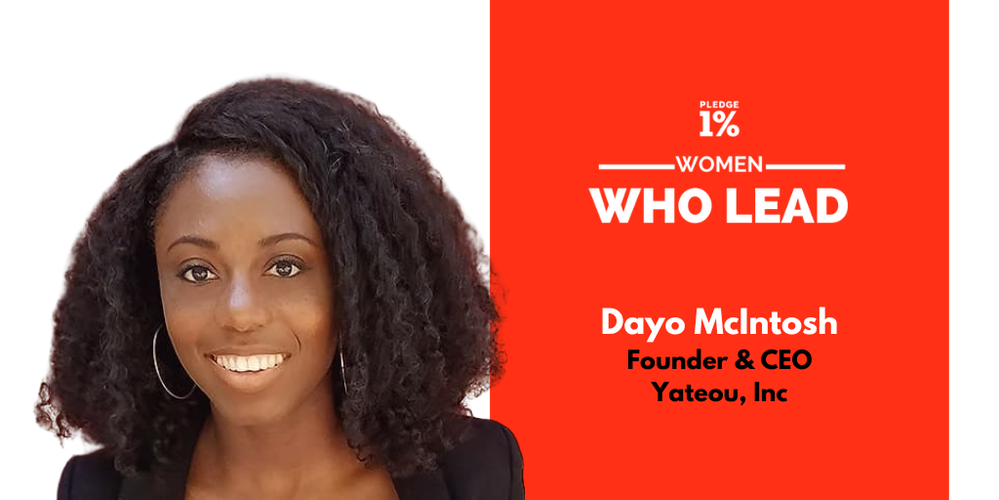
Dayo McIntosh
Founder & CEO, Yateou, Inc
Sparks, USA
If you could describe yourself in one word, what would that be and why?
Resilient.
Pledge 1% provides a framework for businesses to do good. Do you think it’s important for today’s corporate leaders to prioritize social impact? If so, why?
Yes, I think it’s really important for corporate leaders today to focus on making a positive impact on society. Our world is complicated and marked by both chaos and injustice, so it’s crucial for business leaders to actively work towards positive change. Programs like Pledge 1% provide a good structure for businesses to contribute to making society better. When corporate leaders prioritize social impact, they’re not just doing it because it’s the right thing, but they’re also playing a big role in creating a future where the next generations can thrive. Making a commitment to positive action is a key part of moving towards a world that’s fair and inclusive, where everyone is recognized for their value.
Do you give back to the community with your team and work? If so, what does this look like?
As a socially conscious business, we contribute 10% of our profits to empower women, supporting initiatives both in the US and globally, particularly in underprivileged communities. Data shows that when women are supported, community success skyrockets. We aim to play a vital role in moving the world forward positively.
Additionally, we’re committed to closing technological gaps in marginalized US communities. Personally, as a black woman, I understand the struggle of lacking resources and representation. It’s hard to dream big when you can’t see yourself in certain places. I partner with organizations like Girls on the Run, showcasing my robot. The interest level and response from the girls always resonates and brings everything full circle for me. Being able to inspire the next generation is surreal and energizing, I am determined to keep showing up so that little girls and boys who look like me can hold their heads a little higher.
What’s the best piece of advice you’ve ever received?
“What would you do if you weren’t afraid”? Do it!
What advice do you have for women who are just starting their career?
For women initiating their careers, I recommend seeking mentorship within your company, industry, or from someone following a career path aligned with your aspirations.
“Developing connections with accomplished professionals in influential roles not only secures an advocate within your field but also affords valuable insights, aiding in a more strategic navigation of your career journey.”
Additionally, consider embracing opportunities that may be overlooked by others, as this approach can distinguish you and contribute to your professional growth.
What are you looking forward to this year? Are there any goals (personal or professional), activities, or experiences you are excited about?
I am very excited about this year as it signifies the culmination of extensive efforts spanning five years. The highlight is the upcoming launch of our first-ever experiential robotic kiosk, set to debut in Vegas. With our unique patented robotic application, we aspire to create a network of interconnected kiosks in bustling places like airports and malls.
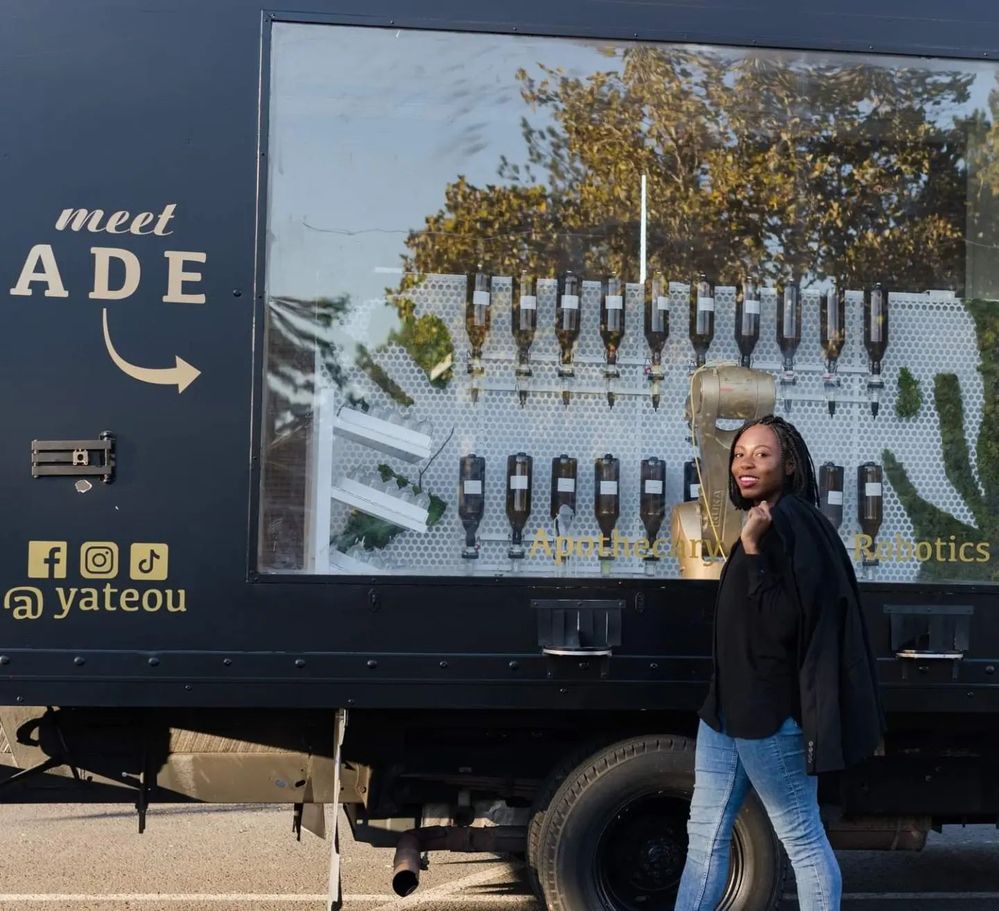
These kiosks go beyond being operational hubs for manufacturing; they are integral to our marketing and sales strategy. Picture this: you’re in a mall, and a robot is crafting personalized skincare products, on demand! The kiosks serve as a gateway to attract and engage people, aiming to convert them into long-term customers. This launch signifies the full realization of Yateou, a groundbreaking fusion of beauty, artificial intelligence, and robotics.
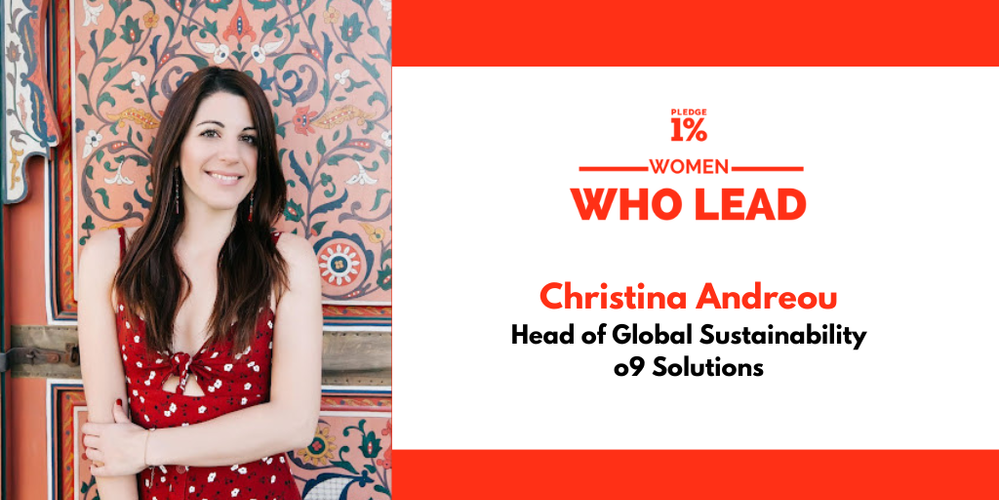
Christina Andreou
Head of Global Sustainability, o9 Solutions
Amsterdam, NL
If you could describe yourself in one word, what would that be and why? Please explain with a short story or example.
Courageous. Since a young age, I was always curious to try new things and continuously learn and grow. Twelve years ago, I left Athens, my home country to pursue a Masters in Sustainability in Geneva, a choice that opened to me a whole new world of possibilities. Six years later, feeling quite limited in the choices I had there, I decided to take a job and move to Amsterdam, the Netherlands. Every time I move, there is always an element of discomfort and fear, but by making these moves, I discover new aspects of myself, along with different cultures.
Pledge 1% provides a framework for businesses to do good. Do you think it’s important for today’s corporate leaders to prioritize social impact?
Nowadays on the one hand the advancement of technology is unprecedented, with generative AI as an example. On the other hand, inequalities as well as huge challenges for nature and the environment continue to exist. The need for businesses to step up and use their resources to do good is needed as ever.
We as a company have Paul Polman’s “Net Positive” as North Star, we want the planet to be a better place because of o9’s positive impact, we make that happen first and foremost by utilizing our technology to streamline the supply chains of the most impactful companies in the world and we are well aware that we cannot make that happen without being an integral part of communities such as Pledge 1%, as well as Climate Pledge and UN Global Compact.
Do you give back to the community with your team and work? If so, what does this look like? Please feel free to add a specific story or experience.
At o9, we have built an employee impact program as part of the Pledge 1% community of WePledge. We support employees to donate time and funds to causes that inspire them, while at the same time we are evolving our company’s philanthropic efforts. In 2024, we are launching for the first time the “o9 Grant”, a program that will enable a selected non profit, in this case Make a Difference (MAD), to scale their technology capabilities of their programs to the community. I am very proud of the team that has put this program in place and is continuously striving to be best in class and also partner with other stakeholders in the philanthropy community to scale our impact.
What’s the best piece of advice you ever received?
It comes from my MBA program. That the first draft of anything we prepare, should never be the final one. Even though that specific tip was regarding academic paper drafts, it highlights the importance of patience and iterations of our work. In the beginning any project is not perfect, but as we work on it, we have the chance to improve it and make it excellent.
This year’s International Women’s Day themes are focused on investing in women and inspiring inclusion. What can we do to make today’s workplaces more equitable and inclusive for women?
I think the best thing is to not expect them to think and behave like men, but rather to embrace their way of working and leading. And also to promote the idea of men supporting women, it’s not only about women supporting women.
“I think the best thing is to not expect them to think and behave like men, but rather to embrace their way of working and leading. And also to promote the idea of men supporting women, it’s not only about women supporting women.”
What advice do you have for women who are just starting their career?
To follow their intuition. Oftentimes, there is a little voice telling us what to do next, we should not be afraid to follow it. Even if a step in your life or career doesn’t make rational sense, if it makes sense to you at the given time, then do it, because you will be more authentic.
What are you looking forward to this year? Are there any goals (personal or professional), activities, or experiences you are excited about?
Yes, many! Professionally, this is the year that we implement many strategic initiatives especially around our ESG transformation so I am eager to see what we achieve by the end of this year. Personally, first of all I signed up for a sprint triathlon in my home country in Greece in May, not sure why (!) as the training is quite demanding, but I am always looking to extend my limits and build my self confidence with these types of athletic initiatives.
Hobby wise, I am an electronic music DJ so it would be great to also play at some nice occasions as well.
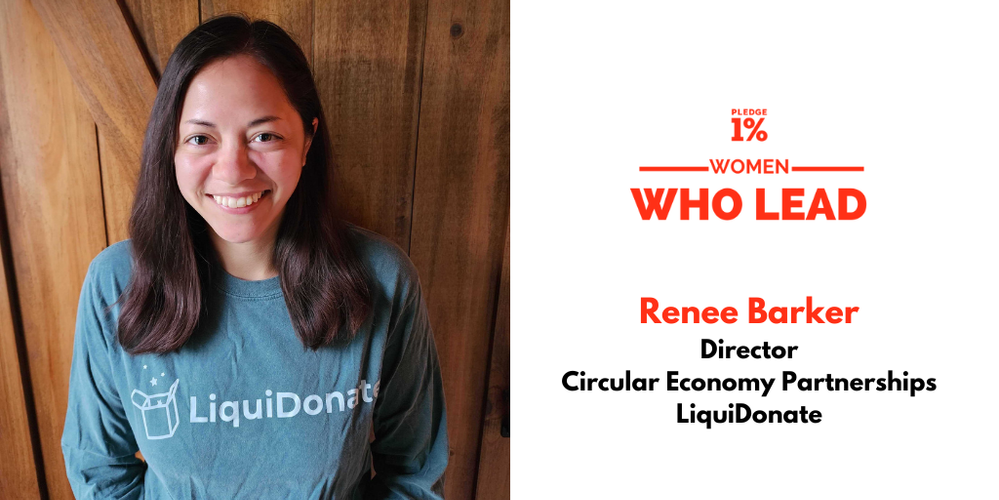
Renee Barker
Director, Circular Economy Partnerships, LiquiDonate
Nashville, Tennessee, USA
If you could describe yourself in one word, what would that be and why?
Adaptable – leading with the ability to adjust in changing circumstances is so important in an emerging climate tech industry. In my role, it is important to understand and adapt to the needs of our partners on both sides of the equation. For example, I explored how we can provide metrics and storytelling to retailers and nonprofits that match their needs. We do this through customizable reporting and shareable assets for both that relate to their audiences. Retailers want to know pounds diverted and number of recipients and nonprofits want ways to showcase donations in action with their clients.
Pledge 1% provides a framework for businesses to do good. Do you think it’s important for today’s corporate leaders to prioritize social impact? If so, why?
Definitely important! It is so needed to contribute to the future of our communities. We have to continue to collaborate to make a more sustainable world, and operate in a way that builds up society to be more equitable. A corporate culture of sustainability is an ongoing effort, and each time we prioritize social impact we are prioritizing our futures. No matter how large of a business you are, there are always opportunities.
Do you give back to the community with your team and work? If so, what does this look like?
I love that LiquiDonate offers paid volunteer time, and that we take initiative in volunteering when our remote team gets together. When we travel for a conference or event, we set aside time to work with a local organization. Some examples this past year include volunteering at a food bank, picking up litter, sorting items at a community center, food rescue, and more.
What’s the best piece of advice you’ve ever received?
You don’t know what you don’t know and that’s okay! Seek opportunities to connect with others and learn from people. Sharing and collaborating is how we can all grow.
“Seek opportunities to connect with others and learn from people. Sharing and collaborating is how we can all grow.”
This year’s International Women’s Day themes are focused on investing in women and inspiring inclusion. What can we do to make today’s workplaces more equitable and inclusive for women?
Workplace transparency is important and I believe we are past the days of safeguarding so many unknowns. To be equitable and inclusive, today’s workplaces can invest in their women and make clear opportunities for training, mentorship, and advancement pathways.
What advice do you have for women who are just starting their career?
Informational interviews! Find someone who has the job you want or does something you find interesting, and learn more directly from the source. Many folks are very willing to set aside some time to chat and answer specific questions about their career.
What are you looking forward to this year? Are there any goals (personal or professional), activities, or experiences you are excited about?
I’m excited to keep building on our product offerings and expand our network to more nonprofits and schools in need. We hit some great milestones last year — every state now has a member! There is so much more room to grow and help companies make a positive impact in all communities and I hope to move donations in every U.S. city.
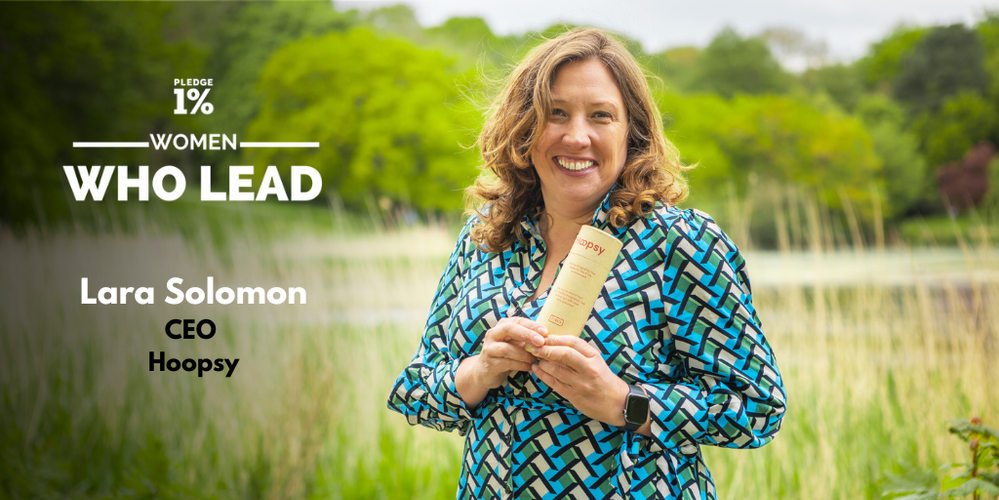
Lara Solomon
CEO, Hoopsy
London, UK
If you could describe yourself in one word, what would that be and why?
Resilient.
Do you give back to the community with your team and work? If so, what does this look like?
We give back through the product we sell in that it causes much less pollution than current pregnancy tests, and also through our free online fertility community that supports women on their fertility journey.
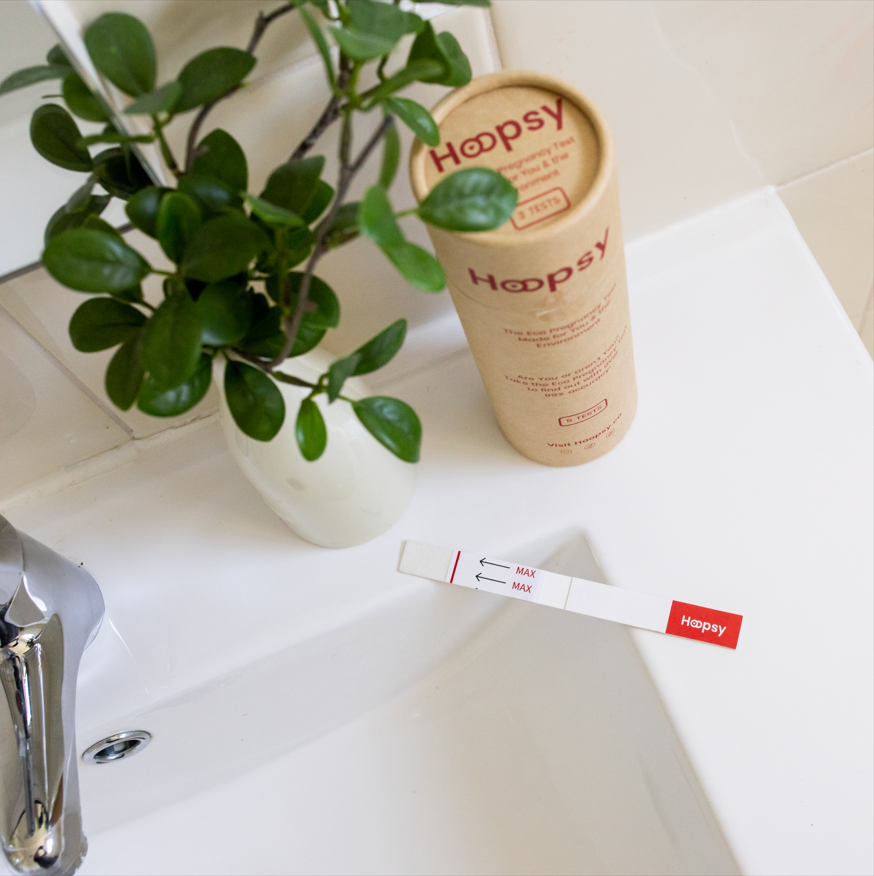
What’s the best piece of advice you’ve ever received?
If it was easy then everyone would do it.
This year’s International Women’s Day themes are focused on investing in women and inspiring inclusion. What can we do to make today’s workplaces more equitable and inclusive for women?
I think it starts with giving women a seat at the table, whatever table is relevant. Men can’t ever really fully understand what it is like to be a woman and therefore it is hard for them to make decisions on their behalf. Get women involved in the decisions and shape of the company to make others feel included.
“I think it starts with giving women a seat at the table, whatever table is relevant.”
What advice do you have for women who are just starting their career?
Don’t be afraid to challenge the status quo, often the only reason things are done a certain way is because they always have been done that way.
What are you looking forward to this year? Are there any goals (personal or professional), activities, or experiences you are excited about?
For Hoopsy I am excited about launching our pregnancy test into Europe and me personally combining travel within Europe with work by working remotely more often.
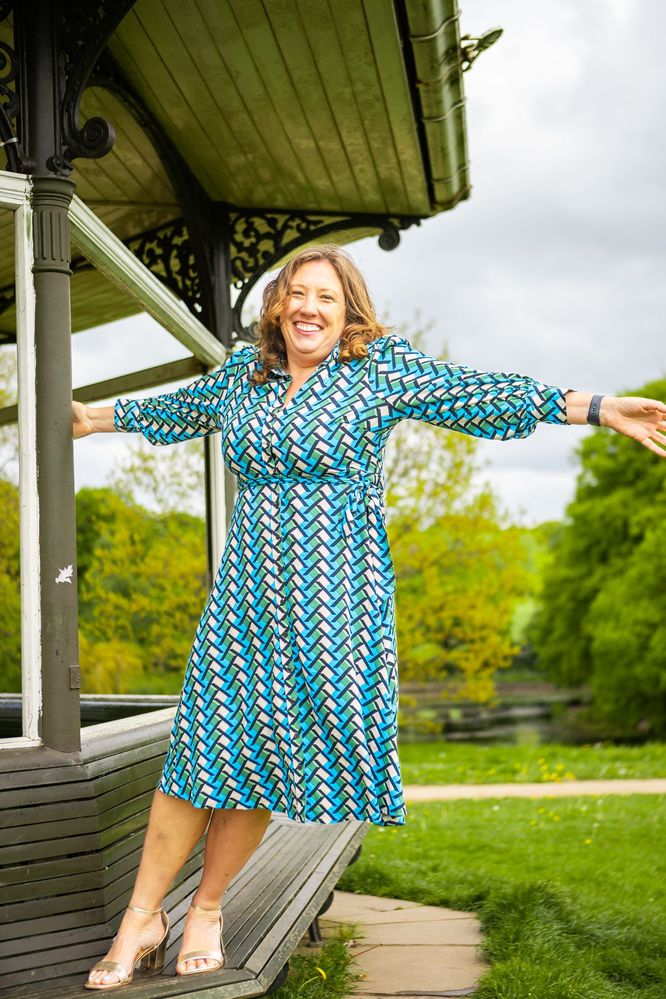
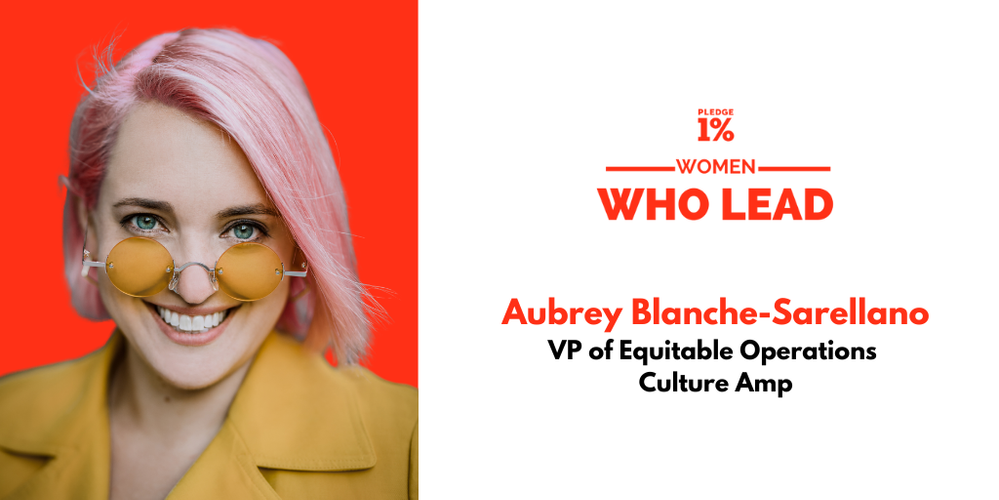
Aubrey Blanche-Sarellano
VP of Equitable Operations, Culture Amp
Sydney, Australia
If you could describe yourself in one word, what would that be and why?
Passionate: I’m someone who thow myself into the things I care about and the challenges that I see. I tend to gravitate towards issues that are difficult and also hold people back from achieving their potential — hence the career I’ve chosen!
Pledge 1% provides a framework for businesses to do good. Do you think it’s important for today’s corporate leaders to prioritize social impact? If so, why?
I believe that given the overall impact that businesses have on society, there is no excuse for them not considering social impact in their operations. It’s leaders’ ethical duty to engage in the world and take responsibility for having impact to make the world better than they found it.
Do you give back to the community with your team and work? If so, what does this look like?
I believe in sharing the specific skills and access that I have. That means that most of my volunteering focuses on free consulting for organizations who couldn’t otherwise afford it, and mentoring folks who haven’t always been given the chance to get support from people in their fields.
What’s the best piece of advice you’ve ever received?
“Know how to tell the difference between rules that are just and unjust, and know what you’re willing to risk to stand on the side of what’s right.”
What advice do you have for women who are just starting their career?
Don’t limit yourself to specific job titles. Figure out what skills you get energy from using and what problems are exciting for you to solve.
“Look for roles–or hack your current one–to do more of what lights you up.”
What are you looking forward to this year? Are there any goals (personal or professional), activities, or experiences you are excited about?
I’m looking forward to having my wedding after a whirlwind couple of years moving back and forth around the world!
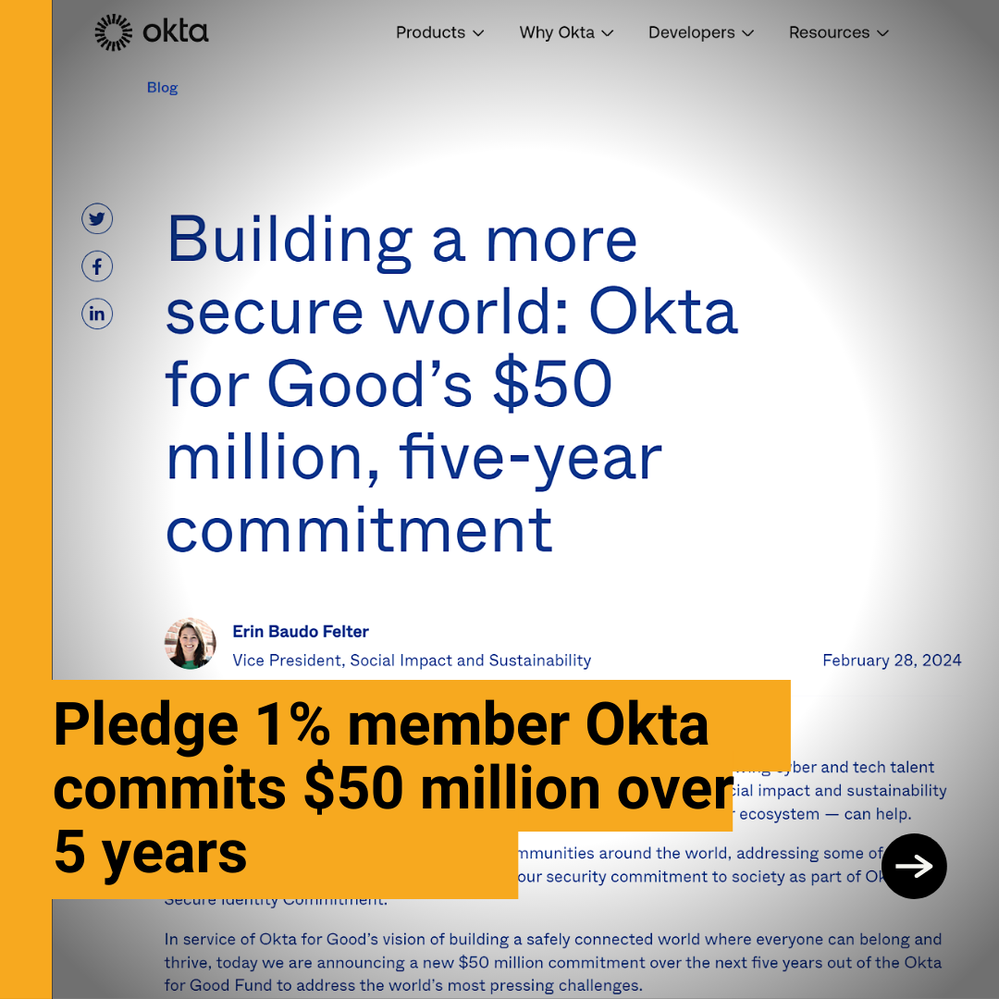
Author: Erin Baudo Felter, Okta
Originally posted here.
Building a more secure world: Okta for Good’s $50 million, five-year commitment
In a challenging year where we have seen rising cybersecurity threats, a growing cyber and tech talent gap, and an acceleration of climate emergencies, Okta for Good, Okta’s social impact and sustainability initiative, has continued to stay focused on the unique ways Okta — and our ecosystem — can help.
It continues to have a measurable impact in communities around the world, addressing some of the world’s most critical challenges and extending our security commitment to society as part of Okta’s Secure Identity Commitment.
In service of Okta for Good’s vision of building a safely connected world where everyone can belong and thrive, today we are announcing a new $50 million commitment over the next five years out of the Okta for Good Fund to address the world’s most pressing challenges.
Our $50 million, Five-year commitment
These funds will be split across three key areas:
-
- $20-million Tech for Good: Accelerating digital transformation and cybersecurity for the social sector and strengthening the cybersecurity posture of civil society organizations.
Cyber insecurity remains one of the top 10 global risks over the next 10 years and has implications for every organization across every sector while having a significant impact on society’s most vulnerable communities. Nonprofits are the second-most-attacked sector, behind only governments, when it comes to cyberthreats, with 65% of large NGOs lacking confidence in their own security posture due to insufficient resources to protect themselves and those they serve.
Okta is a founding partner of Nethope’s Center for the Digital Nonprofit and Nethope’s Global Humanitarian Information Sharing & Analysis Center (ISAC) — a first-of-its-kind public-private partnership created to better protect nonprofits from rising cyberthreats. Okta’s continued support will help unlock more resources to protect these organizations while increasing their confidence in their security posture for the billions of vulnerable people they serve around the world.
-
- $15-million Digital Equity: Closing the digital divide and expanding economic opportunity by making cyber and tech jobs more accessible to all.
There are simply not enough skilled workers to keep us all safe from cybersecurity threats. In fact, four million cyber jobs remain unfilled globally. We need to move faster to train the next generation of cyber talent.
Since 2022, Okta has funded CodePath, a nonprofit organization focused on re-programming higher education by delivering industry-vetted courses and career support centered on the needs of Black, Latine, Indigenous, and low-income students.
-
- $10-million Climate Action: Supporting security and resilience for communities most impacted by climate change.
Climate change impacts everyone, but particularly communities with limited means and resources.
Since 2022, Okta has supported The Solutions Project, a nonprofit that builds power by scaling solutions, funding, and influence for climate justice. They provide grants to support more than 300 grassroots solutions across the U.S., Puerto Rico, and Indigenous sovereign nations.
We will also allocate $5 million of the funds to support our employees as they invest in their local communities around the world.
Building on foundation of impact
Okta for Good has been a cornerstone of Okta’s culture and values since before Okta’s IPO and a driving force in the community, deploying nearly $24 million in grants, supporting hundreds of organizations, and touching 14 global communities in the first seven years of grantmaking from FY’18–FY’24.
This commitment is the next step in Okta’s journey and builds on years of Okta for Good’s efforts to turn the company’s people, products, and financial resources toward the community.
In our just-released FY24 Okta for Good Impact Report, we outline some of the progress we’ve made over the last year.
-
- $7.3 million in cash contributed by the Okta for Good Fund, Okta, Inc., and Okta employees, representing a 22% year-over-year increase
- $6.0 million in technology and services donated, representing a 25% year-over-year increase
- 88% employee participation in Okta for Good (giving and/or volunteering)
- ~4,000 nonprofits supported through giving and volunteering
Looking ahead
We recognize the interconnected nature of societal issues, and we strive to ensure that social and environmental impact is integrated across our business strategy and processes. This latest investment reinforces our ongoing commitment to serve our communities at a time when macro world threats demand that we step up and do more. We have the opportunity to be intentional and accountable for being the driving agent for the change we want to see. We look forward to the work ahead with our partners and stakeholders and to providing updates on our progress.
To learn more about Okta for Good, our mission, and commitment, read our Impact Report here.